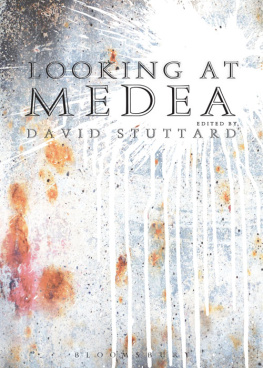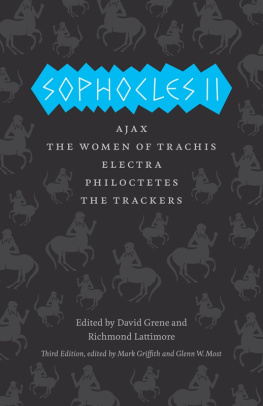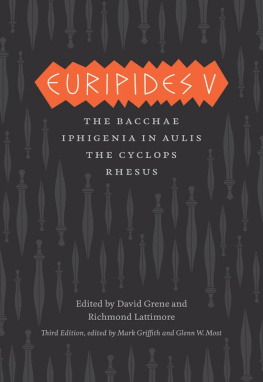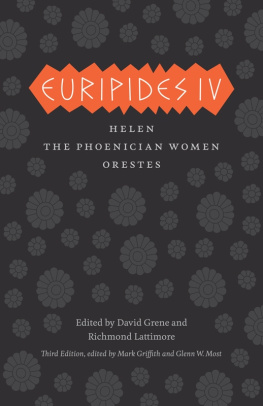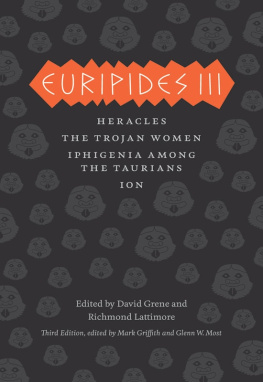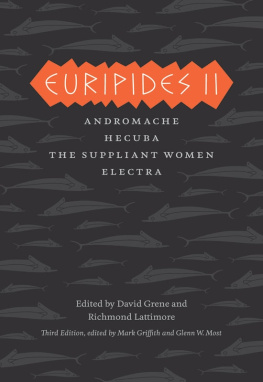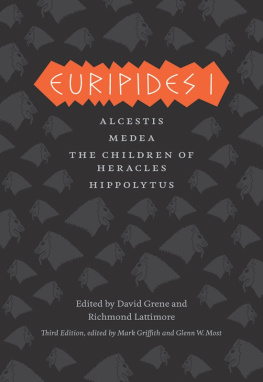Euripides - Medea and Other Plays
Here you can read online Euripides - Medea and Other Plays full text of the book (entire story) in english for free. Download pdf and epub, get meaning, cover and reviews about this ebook. year: 2010;2019, publisher: Penguin Group USA, Inc., genre: Children. Description of the work, (preface) as well as reviews are available. Best literature library LitArk.com created for fans of good reading and offers a wide selection of genres:
Romance novel
Science fiction
Adventure
Detective
Science
History
Home and family
Prose
Art
Politics
Computer
Non-fiction
Religion
Business
Children
Humor
Choose a favorite category and find really read worthwhile books. Enjoy immersion in the world of imagination, feel the emotions of the characters or learn something new for yourself, make an fascinating discovery.
Medea and Other Plays: summary, description and annotation
We offer to read an annotation, description, summary or preface (depends on what the author of the book "Medea and Other Plays" wrote himself). If you haven't found the necessary information about the book — write in the comments, we will try to find it.
Translated by John Davie with an Introduction and Notes by Richard Rutherford.
Medea and Other Plays — read online for free the complete book (whole text) full work
Below is the text of the book, divided by pages. System saving the place of the last page read, allows you to conveniently read the book "Medea and Other Plays" online for free, without having to search again every time where you left off. Put a bookmark, and you can go to the page where you finished reading at any time.
Font size:
Interval:
Bookmark:

EURIPIDES was an Athenian born in 484 BC. A member of a family of considerable rank, he disliked performing the public duties expected of him, preferring a life of introspection. Such a man was likely to win only grudging admiration and little popularity, and during fifty years writing of plays for the festivals of Dionysus he was awarded the prize only four or five times. His unpopularity seems to have come to a head towards the end of his life in some way unknown to us, and he went into voluntary exile at the court of Archelaus, King of Macedon. It was during these last months that he wrote what many consider his greatest work, The Bacchae. When news of his death reached Athens in 407 BC Sophocles appeared publicly in mourning for him. Euripides is thought to have written about ninety-two plays, of which seventeen known to be his survive.
PHILIP VELLACOTT translated the following volumes for the Penguin Classics: the complete plays of Aeschylus, the complete plays of Euripides, and a volume of Menander and Theophrastus. He was educated at St Pauls School and Magdalene College, Cambridge, and for twenty-four years taught classics (and drama for twelve years) at Dulwich College. He lectured on Greek drama on ten tours in the USA, and spent four terms as Visiting Lecturer in the University of California at Santa Cruz. He wrote a number of books including Sophocles and Oedipus (1971), Ironic Drama: A Study of Euripides Method and Meaning (1975) and The Logic of Tragedy: Morals and Integrity in Aeschylus Oresteia (1984). Philip Vellacott died in 1997.

MEDEA HECABE ELECTRA HERACLES
Translated with an Introduction by
PHILIP VELLACOTT
PENGUIN BOOKS
PENGUIN BOOKS
Published by the Penguin Group
Penguin Books Ltd, 80 Strand, London WC2R 0RL, England
Penguin Putnam Inc., 375 Hudson Street, New York, New York 10014, USA
Penguin Books Australia Ltd, 250 Camberwell Road, Camberwell, Victoria 3124, Australia
Penguin Books Canada Ltd, 10 Alcorn Avenue, Toronto, Ontario, Canada M4V 3B2
Penguin Books India (P) Ltd, 11 Community Centre, Panchsheel Park, New Delhi 110 017, India
Penguin Books (NZ) Ltd, Cnr Rosedale and Airborne Roads, Albany, Auckland, New Zealand
Penguin Books (South Africa) (Pty) Ltd, 24 Sturdee Avenue, Rosebank 2196, South Africa
Penguin Books Ltd, Registered Offices: 80 Strand, London WC2R 0RL, England
www.penguin.com
This translation first published 1963
57
Copyright Philip Vellacott, 1963
All rights reserved
The terms of the performance of these plays may be obtained from The League of Dramatists, 84 Drayton Gardens, London SW10 9SD, to whom all applications for permission should be made
Except in the United States of America, this book is sold subject to the condition that it shall not, by way of trade or otherwise, be lent, re-sold, hired out, or otherwise circulated without the publishers prior consent in any form of binding or cover other than that in which it is published and without a similar condition including this condition being imposed on the subsequent purchaser
ISBN: 9781101487693
OF the four plays in this volume, three have in common a point of special interest for their first audience. Medea, Electra, and Heracles are set respectively in Corinth, Argos, and Thebes; but for the solution of their dilemmas, the cleansing of their guilt, they all look to Athens. This observation perhaps illumines one aspect of the unique greatness of Athens. The hypocrisy of neglected ideals has often been condemned as a major sin; but in the moral world as in the romantic, it is better to have loved and lost than never to have loved. The Athenians in their actions were certainly as cruel, as dishonest, as greedy, as revengeful, as irreligious, as other Greeks; but in their thoughts and aspirations many of them loved and honoured justice, integrity, and generosity, and loved their city as the shining embodiment of those virtues which it was not. Faith without works may be dead but faith is seldom entirely without works; and the works of the tragedians kept alive the faith of Athenians in the beauty of goodness, and in what their city had sometimes tried to be, even if success had been rare: the sanctuary of Hellas.
In Electra, Orestes guilt was incurred wittingly but at the command of a god; in Heracles, the crime was committed in pure innocence. By contrast, Medeas only excuse was her natural passion for revenge; yet she, no less than the others, could rely on sanctuary in Athens. The Chorus of Corinthian women follow their celebrated hymn of praise for Athens with questions voicing the instinctive protest that there are degrees of wickedness which pollute sanctuary but that cannot change the story. That this principle of the open gate still had significance in historical times is shown byThucydides insistence on it in Pericles Funeral Speech (in Book ii), where it is stated with pride that Athens allowed free coming and going through her city gates. In Medea Euripides compliment to his city in this hymn of praise appears in some measure to compensate for the effect of the preceding scene.
The king of Athens and his friendly offer to Medea were part of the unalterable legend, and would be accepted as such by the Athenian audience; but the treatment of the episode in this play is not only curiously arbitrary and unrelated to the rest of the action, but more than a little satirical; and the figure of Aegeus provides the one flicker of relief in the otherwise uniform sombreness of the drama.
This, the earliest extant tragedy of Euripides (it is preceded only by Alcestis), shows a moral pattern similar to that of his last work, The Bacchae. It opens with an oppressed victim claiming the sympathy of Chorus and audience. As the action develops inevitably, and the punishment shows itself twice as wicked as the crime, sympathy changes sides; and we are left with only one comfort, that since the worst has been reached, there can be no worse thing to follow.
To appreciate the balance of this play, we must take care not to prejudge Jason. He was a man of entirely respectable ambitions; and to these ambitions Medea presented two fatal obstacles: she had involved him in murder before ever he came to Corinth; and as a non-Greek she could never be recognized by Greeks as his wife. And the first of these obstacles is of course part of the reason for the second. Marathon and Salamis had made the Athenians vividly conscious that the establishment and growth of civilized values in a barbarous world lay with them alone as the leaders of Hellenic culture. For Greeks, civilized life meant controlled, orderly, proportionate life,  No excess. As a principle this applied equally to everything politics, social habits, art. To them it was the only life, and the want of it a living death. Those who had died for it in the great battles or in resistance to tyranny were their most honoured heroes. This is the principle for which Jason stands. If his behaviour strikes us as repellent, that is how the behaviour of Athenians struck many Greeks of other States in the days when Athens claimed to be the champion of the Greek way of life, and the firm opponent of barbarism and all its ways.
No excess. As a principle this applied equally to everything politics, social habits, art. To them it was the only life, and the want of it a living death. Those who had died for it in the great battles or in resistance to tyranny were their most honoured heroes. This is the principle for which Jason stands. If his behaviour strikes us as repellent, that is how the behaviour of Athenians struck many Greeks of other States in the days when Athens claimed to be the champion of the Greek way of life, and the firm opponent of barbarism and all its ways.
Font size:
Interval:
Bookmark:
Similar books «Medea and Other Plays»
Look at similar books to Medea and Other Plays. We have selected literature similar in name and meaning in the hope of providing readers with more options to find new, interesting, not yet read works.
Discussion, reviews of the book Medea and Other Plays and just readers' own opinions. Leave your comments, write what you think about the work, its meaning or the main characters. Specify what exactly you liked and what you didn't like, and why you think so.


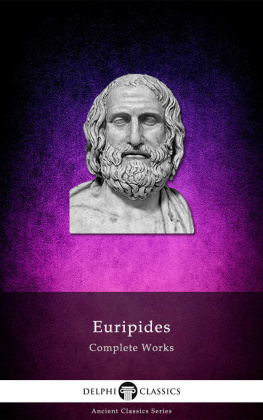
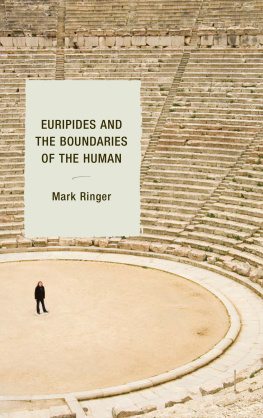
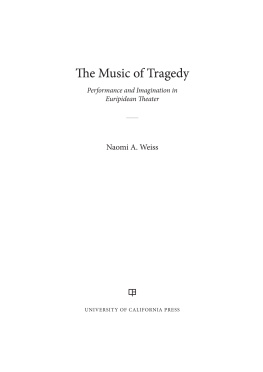
![Euripides - Classic Greek Drama: 10 Plays by Euripides in a Single File [NOOK Book]](/uploads/posts/book/43473/thumbs/euripides-classic-greek-drama-10-plays-by.jpg)



